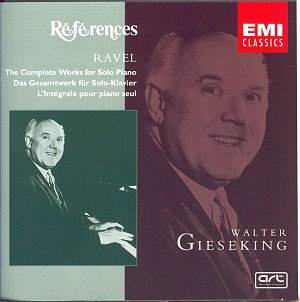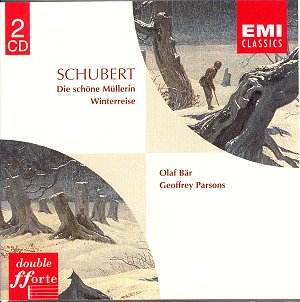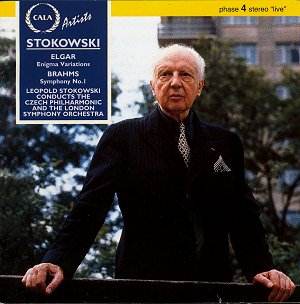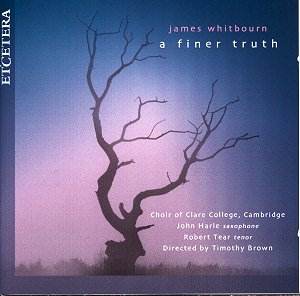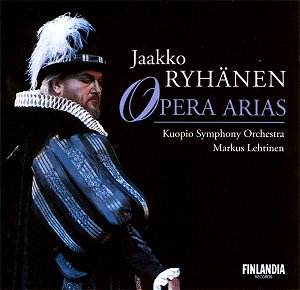 Composer: Jaakko Ryhänen
Composer: Jaakko Ryhänen
Works: Don Giovanni: “Madamina,” Die Entführung aus dem Serail: “Ha, wie will ich triumphieren,” Die Zauberflöte: “O Isis und Osiris,” In diesen heil’gen Hallen; Il Barbiere di Siviglia: “La calunnia è un venticello”; Don Carlos: “Ella giammai m’amò,” Macbeth: “Studia il passo,” Simon Boccanegra: “A te l’estremo addio,” Der fliegende Holländer: “Mögst du mein Kind,” The Last Temptations: “Fisherman Monologue,” Eugene Onegin: “Gremin’s aria,” Boris Godunov: Prologue (Coronation Scene), Death Scene (Act IV)
Performers: Jaakko Ryhänen (bass), Tampere Opera Choir, Kuopio Symphony Orchestra/Markus Lehtinen
Recording: 15-18.5.2001, Kuopio Music Centre
Label: FINLANDIA 8573-87779-2 [67.41]
Jaakko Ryhänen emerges as a formidable presence in the pantheon of operatic basses with this collection of arias, showcasing both the depth of his vocal talent and the historical breadth of the roles he embodies. The repertoire ranges from the quintessentially dramatic to the humorously light, offering a survey of operatic history from Mozart through Verdi and beyond to contemporary works. Each piece, steeped in its own era’s emotional and musical language, provides the listener with a window into the evolving nature of operatic characterization and vocal technique.
Ryhänen’s tonal richness is particularly striking in the Verdi selections, where his command of the dramatic narrative shines. In “Ella giammai m’amò,” his voice carries the weight of despair, embodying the character of a man grappling with unrequited love. The phrasing here is expansive; however, moments of intensity reveal a potential for greater nuance that could elevate the portrayal. The bass’s interpretation reveals a strong command of the text, yet at times, the emotional peaks feel constrained, lacking the visceral urgency one might expect from these iconic arias. This restraint is somewhat less evident in “A te l’estremo addio,” where Ryhänen’s authority is palpable, and the culmination of his vocal artistry resonates with a compelling gravitas.
The technical aspects of Ryhänen’s performance warrant a closer examination. His lower register is formidable, producing a resonant sound that navigates the depths with ease. However, as observed in the lighter Mozartian fare, there is a notable challenge in articulating rapid passages. In “Madamina,” for instance, the clarity of text becomes muddled as the tempo increases, a phenomenon that also affects “Ha, wie will ich triumphieren.” This is not merely a linguistic issue, for it reflects a broader challenge often faced by singers of substantial vocal heft—preserving diction within the confines of agility. Comparatively, one might reference the late Boris Christoff, whose ability to navigate similar passages with crystalline clarity remains a benchmark for bass singers.
The engineering of this recording deserves commendation, as it captures the warmth and depth of Ryhänen’s voice while allowing the orchestral accompaniment to breathe. The Kuopio Symphony Orchestra, under Markus Lehtinen’s direction, provides a solid foundation, ensuring that the orchestral textures complement rather than overshadow the vocal lines. The Tampere Opera Choir adds a rich choral backdrop in selections such as the “Coronation Scene” from Boris Godunov, enhancing the overall dramatic effect with their robust sound.
Ryhänen’s interpretation, while impressive in its authority and breadth, occasionally lacks the memorability that characterizes the greatest performances in the operatic canon. His renditions convey respect for the material, yet one desires a deeper exploration of the emotional landscapes these arias inhabit. The more introspective moments, such as “O Isis und Osiris,” could benefit from a more nuanced exploration of the character’s psychological depth.
A well-rounded selection like this serves as a valuable resource for both opera aficionados and those less familiar with the repertoire. Ryhänen’s contributions to the disc reflect a career steeped in operatic tradition, and while his performances may not always reach the heights of interpretive brilliance, they nonetheless present a compelling portrait of a singer who has dedicated himself to the art form. This collection ultimately stands as a testament to both Ryhänen’s talent and the enduring power of these operatic masterpieces.
